
Hello! We are Tia Bastian, Carolina De La Rosa Mateo, Anne Gomez, and Vidhya Shanker. Minnesota is home to:
- some of the largest numbers of foundations, nonprofits, and evaluators—including two of the most influential—per capita;
- some of the largest urban indigenous populations and some of the largest refugee populations; and
- some of the worst racial disparities.
Exactly a year ago, Minnesota became known for the state-sponsored murder of George Floyd. As foretold by Prince, though—who went to school in the neighborhood of the murder—Minnesota subsequently birthed a revolution. In evaluation, too, a small revolution started in Minnesota: Today, we introduce the MN IBPOC in Evaluation Community of Praxis (CoP) sponsoring this week’s blogs.

At AEA’s 2012 conference in Minneapolis, Vidhya co-led a session with local groups entitled The Revolution Will Not Be Culturally Competent. Its title drew from Gil Scott Heron’s song about revolution not being for consumption and INCITE’s book about the nonprofit industrial complex. The session used stop-action theater to illustrate the ineffectiveness of cultural competence in an industry built on European colonization.
When AEA’s conference returned to Minneapolis in 2019, she reprised the performance in a daylong adaptation called The Revolution Will Not Be Culturally Competent (or Diverse or Inclusive), based on her dissertation research. As in 2012, it involved convening local evaluator-actors to play the roles. During rehearsals, we affirmed each other’s experiences in evaluation as not isolated but pervasive. Having found the gatherings life-giving and possibly life-changing, we didn’t want them to end. We decided to create a vehicle to continue engaging in “praxis”—collective reflection, theorizing, and action—and met Kassira Absar and Choua Her in the process.

Twenty-five IBPOC evaluators met the next month. We now have 90 members, six guiding principles, ten topic areas, and a budding circle of elders—senior evaluation scholar/practitioners who have led evaluation’s understanding of structural oppression. When COVID-19 halted things for many co-founders, others took up the mantle—like birds in formation—so the CoP has continued nurturing members’ collaborative pursuit of RFPs. We’ve presented on Why is #EvalSoWhite? for the Center for Evaluation Innovation’s (CEI) Evaluation Roundtable, the Minnesota Evaluation Association, and Grantmakers for Effective Organizations. Demonstrating its commitment to work initiated and led by, for, with, and as racially otherized evaluators, CEI offered us our first gift, which we’ll use to engage our members and communities in organizing intentionally rather than replicating patterns that reproduce stratification.

Our CoP envisions evaluation and surrounding industries reflecting racially otherized communities’ ancestral, experiential, and community knowledge; building their economic power; and countering dominant narratives of racialized difference, disparities, and disproportionalities. We’re repairing, reversing, redressing, and regenerating from the racialized circulation of capital within evaluation—wherein our knowledge is excluded, exploited, and extracted in ways that prevent its application to knowledge production and problem solving. We’re challenging individualistic notions of knowledge production and social change by organizing as a regenerative network within a larger ecosystem. We’re based not on a dearth of qualified evaluators of color but rather on the wealth of ancestral knowledge and contemporary insight among us.

Unlike a network that helps more individuals make it in an unfair system, our CoP collectively makes the system more fair through non-hierarchical, rotating leadership and feedback loops. Part mutual aid society, labor union, and co-op, it cultivates critical mass, critical connections, and critical consciousness. It provides a supportive space for members’ healing and consciousness-raising; allows members to counter dominant, deficit-based narratives through collaborative publications and presentations; and shapes evaluation practice and field-wide demographics through entrepreneurship among racially otherized evaluators. After all, “minority-owned businesses” are the primary generators of employment and income in racially otherized communities.

This week features some CoP members’ thinking. It will become obvious why The Revolution started in Minneapolis!
Get Involved
- IBPOC working in evaluation in Minnesota can join our list-serve or Facebook group
- Accomplices and peers can contact the CoP at ibpoceval@gmail.com

The American Evaluation Association is hosting MN IBPOC in Evaluation Community of Praxis Week. Do you have questions, concerns, kudos, or content to extend this aea365 contribution? Please add them in the comments section for this post on the aea365 webpage so that we may enrich our community of practice. Would you like to submit an aea365 Tip? Please send a note of interest to aea365@eval.org . aea365 is sponsored by the American Evaluation Association and provides a Tip-a-Day by and for evaluators. The views and opinions expressed on the AEA365 blog are solely those of the original authors and other contributors. These views and opinions do not necessarily represent those of the American Evaluation Association, and/or any/all contributors to this site.

What does IBOC mean?